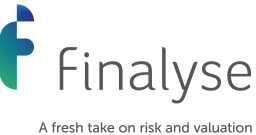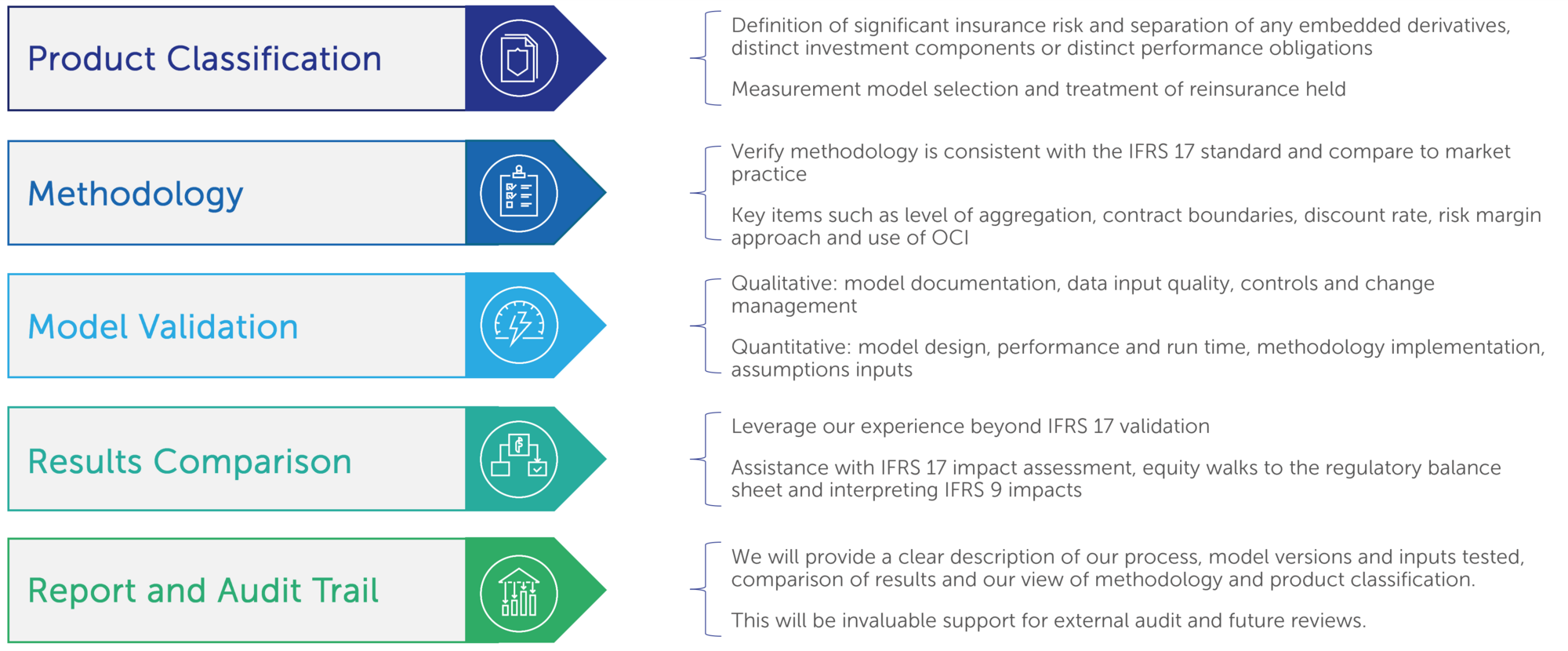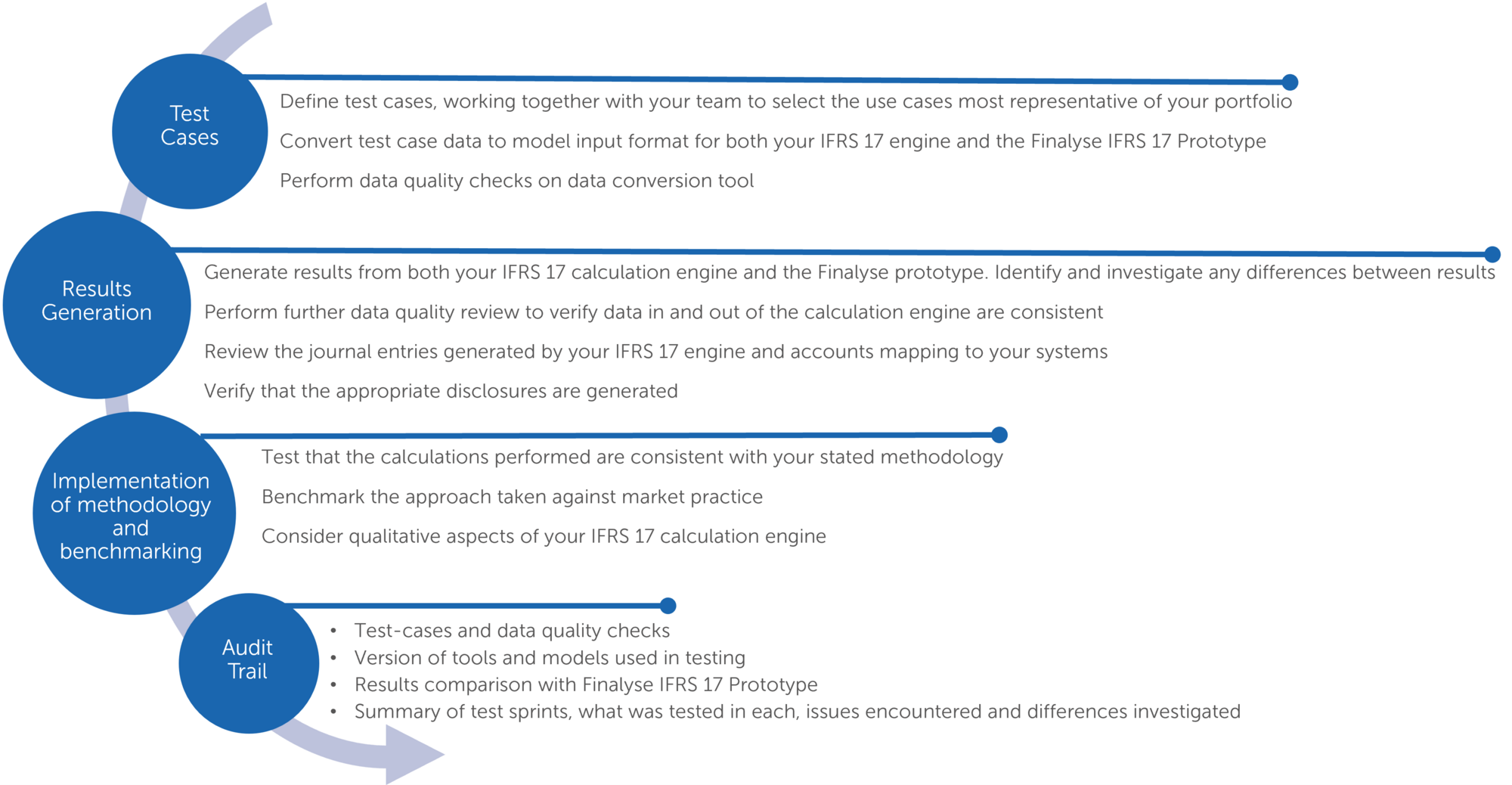Related Articles
How Finalyse can help
IFRS 17 Validation
IFRS 17 will be effective from 1 January 2023 and it will change the recognition, measurement, presentation and disclosure of insurance contracts. It directly impacts how insurers value their insurance liabilities and recognise profits.
Insurers must define methodologies for non-prescribed items such as discount rate, risk adjustment, contract boundaries. New systems must be developed to handle data, perform calculations and generate accounting ledger entries.
How does Finalyse address your challenges?
Validation of your entire IFRS 17 landscape.
Including methodology, configuration and output from accounting engine (cashflows, journal entries and disclosures) which helps provide assurance and identify any gaps in your process.
Our in-house IFRS 17 Toolkit includes:
- CSM Actuarial Prototype
- CSM Generator
- New business generator
- BS Generator
- P&L Generator
- Risk adjustment prototype
- Pre-defined use cases for validation
Independent model validation review.
Setting key design principles, assessing implementation of the methodology, data, assumptions and documenting results.
Assistance in performing your parallel runs and reconciliations with the current IFRS 4 and with the solvency balance sheet
Technical and process recommendations and benchmarking will allow you to refine your approach ahead of transition
Audit Trail with clear documentation of our independent validation process which can be used as support for external audit and future reviews
Key Features
- The introduction of the IFRS 17 standard will bring increased scrutiny from external audit and management. Independent validation from Finalyse provides assurance and will give you a view of how your approach compares to market practice.
- Our experience in model implementation, testing and configuration allows us to have an efficient approach to validation. This approach includes an established testing method, pre-defined use cases, our in-house IFRS 17 Toolkit, pre-defined validation policy and process.
- Working with Finalyse, you will gain insights into the key profit drivers under IFRS 17 and support in developing your Management Information and KPIs under the new standard.
- Finalyse has a business acumen in areas beyond financial reporting, such as actuarial models, IT systems (data management and storage capacities), risk management (ALM and hedging, product design) business strategies and remuneration.

Frans is an actuary and Financial Risk Manager with international experience in the pensions and insurance sectors. He has been specialising in actuarial valuations (AXIS), financial and regulatory reporting (IAS19, US GAAP, IFRS2, IFRS17), regulatory reporting (IORP II, Solvency II, ICS, BMA), market risk management (ALM, SAA), climate change risk management and investment consulting.

Divyank is a Senior Consultant with more than 8 years of experience and a part qualified Actuary. He has acquired expertise in Solvency II, IFRS17 and MCEV reporting and has worked for life and non-life business. He has extensive experience in Prophet modelling, DCS, statutory valuation and IFRS17 implementation and his coding skills include Prophet and DCS modelling, SAS, VBA, R.
Finalyse InsuranceFinalyse offers specialized consulting for insurance and pension sectors, focusing on risk management, actuarial modeling, and regulatory compliance. Their services include Solvency II support, IFRS 17 implementation, and climate risk assessments, ensuring robust frameworks and regulatory alignment for institutions. |

Our Insurance Services
Check out Finalyse Insurance services list that could help your business.
Our Insurance Leaders
Get to know the people behind our services, feel free to ask them any questions.
Client Cases
Read Finalyse client cases regarding our insurance service offer.
Insurance blog articles
Read Finalyse blog articles regarding our insurance service offer.
Trending Services
BMA Regulations
Designed to meet regulatory and strategic requirements of the Actuarial and Risk department
Solvency II
Designed to meet regulatory and strategic requirements of the Actuarial and Risk department.
Outsourced Function Services
Designed to provide cost-efficient and independent assurance to insurance and reinsurance undertakings
Finalyse BankingFinalyse leverages 35+ years of banking expertise to guide you through regulatory challenges with tailored risk solutions. |

Trending Services
AI Fairness Assessment
Designed to help your Risk Management (Validation/AI Team) department in complying with EU AI Act regulatory requirements
CRR3 Validation Toolkit
A tool for banks to validate the implementation of RWA calculations and be better prepared for CRR3 in 2025
FRTB
In 2025, FRTB will become the European norm for Pillar I market risk. Enhanced reporting requirements will also kick in at the start of the year. Are you on track?
Finalyse ValuationValuing complex products is both costly and demanding, requiring quality data, advanced models, and expert support. Finalyse Valuation Services are tailored to client needs, ensuring transparency and ongoing collaboration. Our experts analyse and reconcile counterparty prices to explain and document any differences. |

Trending Services
Independent valuation of OTC and structured products
Helping clients to reconcile price disputes
Value at Risk (VaR) Calculation Service
Save time reviewing the reports instead of producing them yourself
EMIR and SFTR Reporting Services
Helping institutions to cope with reporting-related requirements
CONSENSUS DATA
Be confident about your derivative values with holistic market data at hand
Finalyse PublicationsDiscover Finalyse writings, written for you by our experienced consultants, read whitepapers, our RegBrief and blog articles to stay ahead of the trends in the Banking, Insurance and Managed Services world |

Blog
Finalyse’s take on risk-mitigation techniques and the regulatory requirements that they address
Regulatory Brief
A regularly updated catalogue of key financial policy changes, focusing on risk management, reporting, governance, accounting, and trading
Materials
Read Finalyse whitepapers and research materials on trending subjects
Latest Blog Articles
Contents of a Recovery Plan: What European Insurers Can Learn From the Irish Experience (Part 2 of 2)
Contents of a Recovery Plan: What European Insurers Can Learn From the Irish Experience (Part 1 of 2)
Rethinking 'Risk-Free': Managing the Hidden Risks in Long- and Short-Term Insurance Liabilities
About FinalyseOur aim is to support our clients incorporating changes and innovations in valuation, risk and compliance. We share the ambition to contribute to a sustainable and resilient financial system. Facing these extraordinary challenges is what drives us every day. |

Finalyse CareersUnlock your potential with Finalyse: as risk management pioneers with over 35 years of experience, we provide advisory services and empower clients in making informed decisions. Our mission is to support them in adapting to changes and innovations, contributing to a sustainable and resilient financial system. |

Our Team
Get to know our diverse and multicultural teams, committed to bring new ideas
Why Finalyse
We combine growing fintech expertise, ownership, and a passion for tailored solutions to make a real impact
Career Path
Discover our three business lines and the expert teams delivering smart, reliable support




